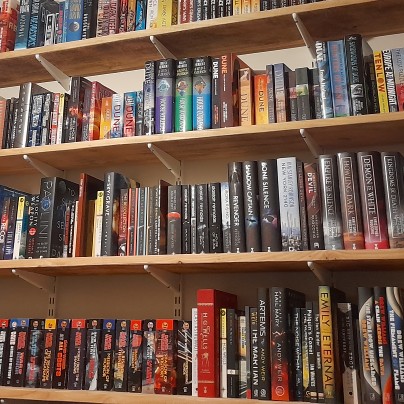For a while now, I’ve been looking at the novels based on the Halo computer game series, thinking that this might be my next shared universe to dive into. I don’t know much about the franchise, but a mix of big science fiction concepts and military action looks to be right up my alley. At the end of August, opportunity presented itself and I bought a copy of the chronological starting point for the whole franchise. Cryptum, by Greg Bear. Bear was an author I’d read once before, with his middle volume in the Second Foundation trilogy having been rather good. Here was a big name author – a Hugo Award-winner no less – writing a book I’d been looking for. It all seemed perfect, so I duly put the book on my TBR stack and resolved to get around to it at some point. Plenty of books after all, and there’s no rush.
Last weekend, Greg Bear died. Amid an outpouring of grief and warm anecdotes from the literary community, there was plenty of encouragement for people to read (or reread) a Greg bear novel in his memory. It’s a lovely sentiment, because what better way to celebrate a man’s life than by cherishing the creations he shared with others? I was tempted to pick up Cryptum then and there. But I held back. And there are a couple of reasons why.
In a way, I’ve been quite lucky. Despite reading books from across the science fiction spectrum, I can’t remember a time when an author has died while I’ve been immersed in their work. Most of the current authors I read are still producing books on an annual basis. And while I read a lot of work from much older authors, the majority of those had already passed away before I started reading what they left behind. I can remember reading the news about Frederik Pohl and Gene Wolf, but I picked up their books much later on, without really thinking about the author in question.
A few months ago, Baen stalwart and alternative history superstore Eric Flint died. Flint was an author I knew only from his co-written Honorverse novels with David Weber. I’d seen his 1632 series on used bookshelves a couple of times, but always passed them by in search of other books. When I found out about his death, my immediate reaction was ‘Maybe I should read 1632 and see what all the fuss was about.’ A similar reaction to when Greg Bear’s passing was announced. I still haven’t read a 1632 novel though, and it’s not just because I’ve got a hefty TBR stack anyway.
Learning about a person’s death and immediately going out to experience their work is a very human reaction. Humans want to have a connection. They want to have something to remember the dead by. At the very least, news of death brings their work back into the public consciousness. A quick look at posthumous sales figures will show an increase in interest. Broadly speaking, this is a good thing. Pretty much anything that puts books in people’s hands is beneficial. It will help people discover books they might otherwise have overlooked. And while it’s not much comfort, those royalties will be some good to the families of the deceased. Death is not a nice thing, but if it can bring about a conversation about books, then at least the person’s legacy endures that little bit longer.
Having said that, I find something a little ghoulish about rushing to read the words of a dead man. Listen, if it weren’t for the lengthy obituaries talking about his work, I might never have discovered Ben Bova. It’s far from the ideal means of finding an audience, but find one it does. And yet, picking up a book so soon after the death of the author, that’s going to create connections. To my mind, if I read Cryptum right now, it will always be the book I read when Greg Bear died. No matter how good it is, even if it’s incredible, that’ll be the association I make. If I leave it just another week or so, however, that association is weakened by the other books I’ve read in the interim.
Then there’s the reviewer angle of it all. I review books honestly, and sometimes that means talking about all the things I didn’t enjoy. I’m fairly confident about Halo as a setting, but what if Greg bear’s writing just doesn’t work for me? I don’t want to be the person who rips a book to shreds just days after the author dies. Even a fairly critical review just seems disrespectful given such a time frame. That extra week or two gives me a bit of space. All very polite and proper. Likewise, if I write a glowing review, I know there will be some people out there who think I’m just trying to cash in on the loss of a science fiction legend. I’m not, and that’s why Greg Bear’s name doesn’t appear in the title of this article, despite it being largely about him. But humans humans can be awful at times, and I want to avoid the idea that my review has been influenced by current events.
If you want to go out and read a book by a recently deceased author, then you should do that. Honestly, it’s probably what they would want you to do. But in the name of propriety, I’m going to hold off on that Cryptum readthrough for a little while yet.

